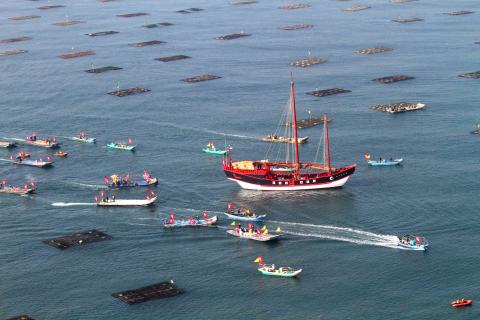A full-size replica of a 17th-century Ming Dynasty armed merchant ship set off on its maiden voyage from Anping Harbor (安平漁港) in Tainan City yesterday to re-enact the scene of the arrival of a Chinese general more than 300 years ago.
Tainan Mayor Hsu Tain-tsair (許添財) launched the replica boat along with Oscar-winning director Ang Lee (李安).
The 29.5m wooden replica sailed, escorted by more than 10 modern ships and police helicopters, to the mouth of the Luermen River, the site of the landing of the Ming Dynasty’s Cheng Cheng-kung (鄭成功), better known as Koxinga, in 1661.

Photo provided courtesy of the Tainan City Government
The replica of the ancient ship is named Taiwan Cheng Kung to commemorate the military leader, who had forced the Dutch out of Taiwan in 1662 and making Taiwan his base for a campaign against the Manchu-ruled Qing dynasty.
To recreate the ship, the Tainan City Government sent officials to Japan in 2008 to obtain a copy of a painting of the vessel held at the Matsura History Museum in Hirado City, Nagasaki Prefecture, where Koxinga was born in 1624.
Based on the 1706 painting, the 270 tonne replica, with a displacement of 135 tonnes, was completed in 18 months and the Council for Cultural Affairs -provided NT$80 million (US$2.5 million) in funds
Unlike the sail-driven original, the replica is equipped with modern navigation devices and an engine. It will conduct a week-long, round-the-island voyage next year as part of celebrations for the 100th anniversary of the founding of the Republic of China.
The ship will also sail to Koxinga’s birthplace in Hirado, as well as Quanzhou in Fujian Province, China, and the outlying islands of Kinmen and Penghu, where Koxinga’s army was once based, the Tainan City Government said.

Taiwan is stepping up plans to create self-sufficient supply chains for combat drones and increase foreign orders from the US to counter China’s numerical superiority, a defense official said on Saturday. Commenting on condition of anonymity, the official said the nation’s armed forces are in agreement with US Admiral Samuel Paparo’s assessment that Taiwan’s military must be prepared to turn the nation’s waters into a “hellscape” for the Chinese People’s Liberation Army (PLA). Paparo, the commander of the US Indo-Pacific Command, reiterated the concept during a Congressional hearing in Washington on Wednesday. He first coined the term in a security conference last

Prosecutors today declined to say who was questioned regarding alleged forgery on petitions to recall Democratic Progressive Party (DPP) legislators, after Chinese-language media earlier reported that members of the Chinese Nationalist Party (KMT) Youth League were brought in for questioning. The Ministry of Justice Investigation Bureau confirmed that two people had been questioned, but did not disclose any further information about the ongoing investigation. KMT Youth League members Lee Hsiao-liang (李孝亮) and Liu Szu-yin (劉思吟) — who are leading the effort to recall DPP caucus chief executive Rosalia Wu (吳思瑤) and Legislator Wu Pei-yi (吳沛憶) — both posted on Facebook saying: “I

Sung Chien-liang (宋建樑), who led efforts to recall Democratic Progressive Party (DPP) Legislator Lee Kun-cheng (李坤城), was released on bail of NT$80,000 today amid outcry over his decision to wear a Nazi armband to questioning the night before. Sung arrived at the New Taipei District Prosecutors’ Office for questioning in a recall petition forgery case last night wearing a red armband bearing a swastika, carrying a copy of Adolf Hitler’s Mein Kampf and giving a Nazi salute. Sung left the building at 1:15am without the armband and covering the book with his coat. Lee said today that this is a serious

The Ministry of Economic Affairs has fined Taobao NT$1.2 million (US$36,912) for advertisements that exceed its approved business scope, requiring the Chinese e-commerce platform to make corrections in the first half of this year or its license may be revoked. Lawmakers have called for stricter enforcement of Chinese e-commerce platforms and measures to prevent China from laundering its goods through Taiwan in response to US President Donald Trump’s heavy tariffs on China. The Legislative Yuan’s Finance Committee met today to discuss policies to prevent China from dumping goods in Taiwan, inviting government agencies to report. Democratic Progressive Party Legislator Kuo Kuo-wen (郭國文) said